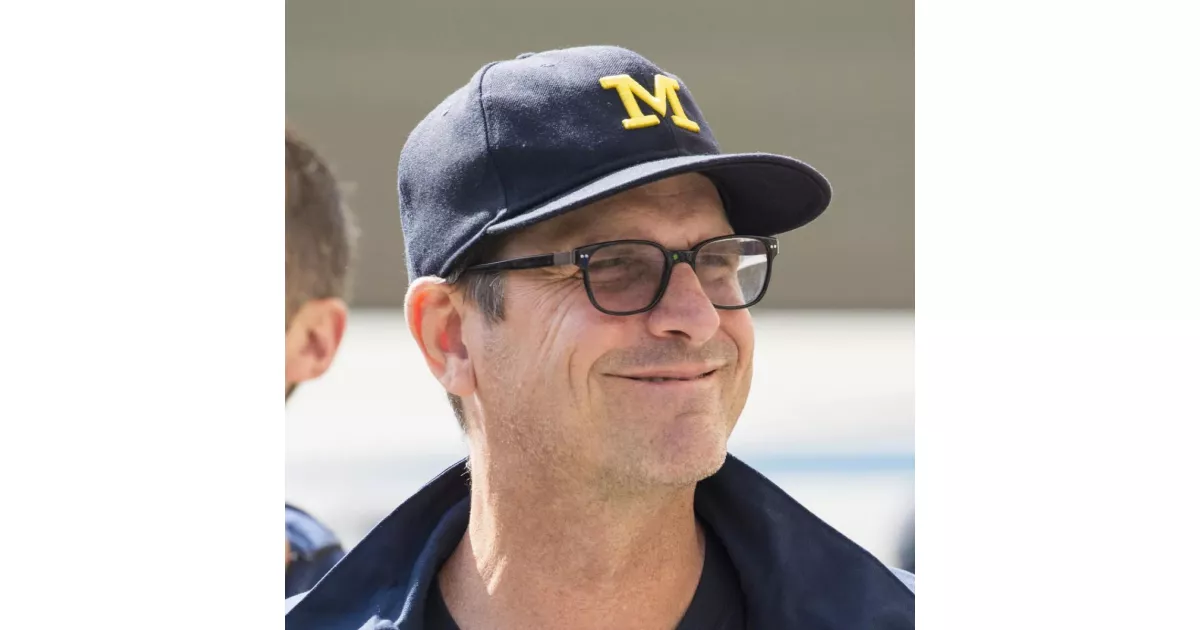Jim Harbaugh is an American football coach, currently the head coach of the Los Angeles Chargers. Previously, he coached the University of Michigan (2015-2023), the San Francisco 49ers (2011-2014), Stanford University (2007-2010), and the University of San Diego (2004-2006). Before coaching, Harbaugh had a 14-season NFL career (1987-2000) as a quarterback, notably with the Chicago Bears (1987-1993), after playing college football at Michigan (1983-1986). He is known for his coaching success at both the college and professional levels.
1901: Jim Harbaugh is one of two coaches in program history to win 10 games in each of his first two seasons
Three weeks later, Michigan defeated Michigan State on the road, its first victory in East Lansing since 2007. They then suffered their first loss of the season to Iowa, before beating Indiana for their 10th victory; Harbaugh is one of only two coaches in program history to win 10 games in each of his first two seasons as head coach, joining Fielding H. Yost (1901–02).
1920: Michigan defeats Rutgers 78-0
In week six of 2016, Michigan soundly defeated Rutgers 78–0, the third-largest margin of victory in program history and the largest margin since 1920.
1948: First Undisputed National Championship Since 1948
The 2023 national championship was the school's first undisputed national championship since 1948.
December 23, 1963: Jim Harbaugh's Birth
On December 23, 1963, James Joseph Harbaugh was born. He later became a football coach and former quarterback.
1966: Michigan become the first team with a pair of 30-point shutouts
On October 3, 2015, The following week, Michigan beat #13 Northwestern 38–0, making the Wolverines the first team with a pair of 30-point shutouts against ranked opponents since Notre Dame's 1966 championship team.
1967: Father's Assistant Coaching Position
In 1967, Jim Harbaugh's father held assistant coaching positions at Morehead State and Bowling Green.
1970: Father's Assistant Coaching Position at Bowling Green
From 1967 to 1970, Jim Harbaugh's father held an assistant coaching position at Bowling Green.
1971: Father's Assistant Coaching Position at Iowa
From 1971 to 1973, Jim Harbaugh's father held an assistant coaching position at Iowa.
1973: Father's Assistant Coaching Position at Michigan
From 1973 to 1979, Jim Harbaugh's father held an assistant coaching position at Michigan.
1979: End of Father's Assistant Coaching Position at Michigan
In 1979 Jim Harbaugh's father ended his time as assistant coach at Michigan.
1980: Father's Assistant Coaching Position at Stanford
From 1980 to 1981, Jim Harbaugh's father held an assistant coaching position at Stanford.
1980: Jack Harbaugh as Stanford's defensive coordinator
From 1980 to 1981, Jim Harbaugh's father, Jack, was Stanford's defensive coordinator.
1981: Jack Harbaugh as Stanford's defensive coordinator
From 1980 to 1981, Jim Harbaugh's father, Jack, was Stanford's defensive coordinator.
1981: End of Father's Assistant Coaching Position at Stanford
In 1981 Jim Harbaugh's father ended his time as assistant coach at Stanford.
1981: Steve Smith's Record-Breaking Season
In 1981, Steve Smith broke Michigan's single-season record with 2,335 yards of total offense.
February 1982: Commitment to Michigan Wolverines
In February 1982, Jim Harbaugh committed to play football for Bo Schembechler's Michigan Wolverines football team.
1982: High School Graduation and Return to Ann Arbor
In 1982, Jim Harbaugh graduated from high school in Palo Alto and returned to Ann Arbor to enroll at the University of Michigan.
1982: Father's Assistant Coaching Position at Western Michigan and High School Graduation
In 1982, Jim Harbaugh's father started as assistant coach at Western Michigan. Also in 1982, Harbaugh graduated from Palo Alto High School.
1982: Previous Record of 118 Set By Steve Smith
In 1982, Steve Smith had set the school record for 118 completions.
1982: Backup Quarterback at Michigan
In 1982, as a freshman, Jim Harbaugh was a backup quarterback to Steve Smith at Michigan, but did not see any game action.
April 1983: Spring Game Performance
In April 1983, Jim Harbaugh performed well in the annual spring game, completing 10 of 15 passes for 116 yards.
November 5, 1983: First Pass for Michigan
On November 5, 1983, Jim Harbaugh completed his first pass for Michigan in a 42–10 victory over Purdue.
1983: Quarterback Competition
In 1983, Jim Harbaugh competed for the starting quarterback job at Michigan.
April 1984: Spring Game Performance and Depth Chart Announcement
In April 1984, Jim Harbaugh impressed observers during the spring game and was announced as the No. 1 quarterback.
October 6, 1984: Broken Arm Injury
On October 6, 1984, Jim Harbaugh sustained a badly broken left arm during a game against Michigan State and missed the remainder of the season.
April 1985: Spring Game Performance After Injury
By April 1985, Jim Harbaugh's arm had healed and he participated in the annual spring game.
October 26, 1985: School Passing Record
On October 26, 1985, Jim Harbaugh set a school record with 283 passing yards in a victory over Indiana.
November 16, 1985: Breaking School Record for Completions
On November 16, 1985, Jim Harbaugh broke the school record for completions with 123 for the season.
1985: Season Passing Statistics and Efficiency Rating
In the 1985 season, Jim Harbaugh completed 145 of 227 passes for 1,976 yards, 18 touchdowns, and six interceptions, leading the nation with a 163.7 passing efficiency rating.
1986: End of Father's Assistant Coaching Position at Western Michigan
From 1982-1986 Jim Harbaugh's father was assistant coach at Western Michigan
1986: Guaranteed Victory Over Ohio State
In 1986, Jim Harbaugh caused controversy when he guaranteed a victory over Ohio State, which proved valid as the Wolverines defeated the Buckeyes 26-24.
1986: Season Passing Statistics
In 1986, Jim Harbaugh completed 180 of 277 passes for 2,729 yards. He also finished second in the country in passing efficiency behind Heisman Trophy winner Vinny Testaverde.
1986: Bachelor of Arts Degree
In 1986, Jim Harbaugh received a Bachelor of Arts degree with a major in communications from the University of Michigan.
1986: Final Season at Michigan
In 1986, Jim Harbaugh started all 13 games at quarterback for Michigan.
1986: Heisman Trophy Finalist
In 1986, as a fifth-year senior, Jim Harbaugh led Michigan to the 1987 Rose Bowl and was a Heisman Trophy finalist, finishing third.
1987: Drafted by Chicago Bears
In 1987, Jim Harbaugh was drafted by the Chicago Bears in the first round of the NFL draft.
1988: First NFL start and win
In 1988, Jim Harbaugh played in 10 games and started his first game on December 5, 1988, a loss to the Los Angeles Rams. On December 12, 1988, he earned his first win as an NFL starter with a victory over the Detroit Lions.
1989: First season with over 1,000 passing yards
In 1989, Jim Harbaugh saw more playing time after Jim McMahon left the team. 1989 was his first season with over 1,000 passing yards. He set a team record for single-season completion percentage with 62.4%.
1990: Regular Starter for Chicago Bears
In 1990, Jim Harbaugh became a regular starting quarterback with the Chicago Bears.
1990: NFC Central Division Win
In 1990, Jim Harbaugh started in the first 14 games of the season. Chicago improved to 11-5 and won the NFC Central division. Harbaugh passed for 2,178 yards. Due to a shoulder injury, he sat out the last two games of the year as well as the playoffs in 1990.
December 29, 1991: Postseason debut
On December 29, 1991, Jim Harbaugh made his postseason debut in the NFC Wild Card Round against the Dallas Cowboys, a 17–13 loss. He went 22-of-44 for 218 yards and threw an interception on the final drive.
1992: Chicago regressed, coach fired
In 1992, Chicago regressed to a 5–11 record, and the team fired coach Ditka. Harbaugh played all 16 games but started only 13 and had a 5–8 record as starter during the 1992 season.
1993: Harbaugh's final season with Chicago
In 1993, Chicago went 7–9. Harbaugh played in and started 15 games. He ended his tenure with Chicago with a 35–30 record during the 1993 season.
April 7, 1994: Signed with the Indianapolis Colts
On April 7, 1994, Jim Harbaugh signed with the Indianapolis Colts. He played and started in just nine games in the 1994 season.
1994: Unpaid assistant coach at Western Kentucky University
From 1994 to 2001, during his final eight seasons in the NFL, Jim Harbaugh served as an NCAA-certified unpaid assistant coach under his father Jack Harbaugh at Western Kentucky University (WKU) as an offensive consultant.
1994: Harbaugh Appears in The Adventures of Brisco County, Jr.
In 1994, Jim Harbaugh appeared as a cowboy in the Western/science fiction show The Adventures of Brisco County, Jr.
1995: "Captain Comeback" nickname
During his time with Indianapolis, particularly in the 1995–96 NFL playoffs, Jim Harbaugh earned the nickname "Captain Comeback" for his ability to lead his team to victory in the fourth quarter when significantly behind.
1995: Career highs and AFC Championship Game
In 1995, Jim Harbaugh achieved career highs in completion percentage (63.7%), passer rating (100.7), and touchdown passes (17) and led Indianapolis to the AFC Championship Game. He strained his right knee during the Week 14 game on December 3, 1995.
1995: AFC Championship Game and Pro Bowl Selection
In 1995, Jim Harbaugh led the Indianapolis Colts to the AFC Championship Game, was selected to the Pro Bowl, and was named NFL Comeback Player of the Year.
December 31, 1995: AFC Wild Card Round win against San Diego
On December 31, 1995, in the AFC Wild Card Round against San Diego, Jim Harbaugh scored on a 3-yard quarterback sneak in the fourth quarter, and Indianapolis won 35–20.
January 7, 1996: Divisional Round win over Kansas City Chiefs
Indianapolis won the Divisional Round game on January 7, 1996, over the Kansas City Chiefs 10–7, despite only 112 passing yards from Jim Harbaugh.
1996: Marriage to Miah Burke
In 1996 Jim Harbaugh married Miah Burke.
1996: Playoff Appearance and Wild Card Loss
In 1996, Indianapolis again finished 9–7 and made the playoffs with Jim Harbaugh as quarterback. The Pittsburgh Steelers defeated Indianapolis in the Wild Card Round 42–14 during the 1996 season.
1996: Harbaugh Appears in Saved by the Bell: The New Class
In 1996, Jim Harbaugh made an appearance on the popular TV show Saved by the Bell: The New Class, playing the cousin of the character Screech.
1996: Cardinal's first bowl win
In 2010, Stanford defeated Virginia Tech 40–12 in the Orange Bowl for the Cardinal's first bowl win since 1996 and the first BCS bowl victory in program history.
1997: Difficult season with the Colts
In 1997, Indianapolis fell to 3–13. Jim Harbaugh missed four games of the season after he punched former quarterback Jim Kelly in the face because Kelly had called him a "baby."
1997: First National Championship Since 1997
The 2023 national championship was the school's first since 1997.
February 14, 1998: Traded to the Baltimore Ravens
On February 14, 1998, the Indianapolis Colts traded Jim Harbaugh to the Baltimore Ravens for draft picks.
1998: Season with the Baltimore Ravens
In 1998, Jim Harbaugh played for the Baltimore Ravens after being traded from the Colts. The Ravens opened a new stadium, Ravens Stadium at Camden Yards, now known as M&T Bank Stadium. Harbaugh suffered an injury during Week 1 on September 6, 1998.
1999: Season with the San Diego Chargers
In 1999, Jim Harbaugh played most of the season for the San Diego Chargers after Ryan Leaf sustained a season-ending injury.
2000: Final season with the Chargers
In 2000, San Diego finished 1-15 with a rotation of quarterbacks including Ryan Leaf, Jim Harbaugh, and Moses Moreno. Harbaugh started five games and played in seven during the 2000 season.
2000: Back to back shutouts
On October 3, 2015, Jim Harbaugh led the Wolverines to a 28–0 shutout win against the Maryland Terrapins, posting back to back shutouts for the first time since 2000.
2001: Unpaid assistant coach at Western Kentucky University
From 1994 to 2001, during his final eight seasons in the NFL, Jim Harbaugh served as an NCAA-certified unpaid assistant coach under his father Jack Harbaugh at Western Kentucky University (WKU) as an offensive consultant.
2001: End of Assistant Coaching at Western Kentucky
In 2001 Jim Harbaugh ended his time as an assistant coach at Western Kentucky University.
2001: Cardinal's bowl appearance
In 2009, the Cardinal had a comeback season, finishing the regular season at 8–4 and receiving an invitation to play in the 2009 Sun Bowl, the Cardinal's first bowl appearance since 2001.
2001: Brief stints with Lions and Panthers, NFL retirement
Prior to the 2001 season, Jim Harbaugh signed with the Detroit Lions but was cut before the season began. He finished his NFL career with the Carolina Panthers in 2001, where he dressed for six games but did not play.
2002: Quarterback coach for the Oakland Raiders
In 2002, Jim Harbaugh became the quarterback coach for the Oakland Raiders under Bill Callahan.
2002: Michigan Season Record
In 2002, Jim Harbaugh's 2,729 passing yards set a Michigan season record which was eventually broken.
2002: Playoff drought for 49ers
In 2011, Jim Harbaugh led the team to a 13–3 record in the regular season, marking the first time the 49ers had made the playoffs since 2002.
2002: WKU Division I-AA National Champion team
Jim Harbaugh was involved in recruiting 17 players on WKU's 2002 Division I-AA national champion team.
2002: 49ers drought
Prior to Jim Harbaugh's arrival, the 49ers had not had a winning season nor a playoff appearance since 2002.
2003: Raiders quarterback coach
In 2003, Jim Harbaugh continued as the quarterback coach for the Oakland Raiders under Bill Callahan.
2004: Head Coach at University of San Diego
In 2004, Jim Harbaugh became the head coach at the University of San Diego.
2004: Head football coach at the University of San Diego
Prior to the 2004 season, Jim Harbaugh was named head football coach at the University of San Diego. In his first year, he directed the Toreros to an overall mark of 7–4.
January 2005: Inducted into the Indianapolis Colts Ring of Honor
In January 2005, Jim Harbaugh was inducted into the Indianapolis Colts Ring of Honor, recognizing his successful and popular tenure with the team.
October 30, 2005: Harbaugh Arrested for DUI
On October 30, 2005, Jim Harbaugh was arrested for DUI after running a stop sign in Encinitas, California. He later pleaded guilty to reckless driving and was sentenced to probation, a fine, and a drunken-driving educational program.
2005: Pioneer League Championship
In 2005, Jim Harbaugh led San Diego to a Pioneer League championship.
December 2006: Named head football coach at Stanford University
In December 2006, Jim Harbaugh was named the head football coach at Stanford University, replacing Walt Harris.
2006: Consecutive Pioneer League Championship
In 2006, Jim Harbaugh led San Diego to a consecutive Pioneer League championship.
2006: Second consecutive Pioneer League title
In 2006, the University of San Diego football team went 11–1 again, winning their second consecutive Pioneer League title with Jim Harbaugh as head coach.
March 2007: Harbaugh Comments on Pete Carroll's Future
In March 2007, Jim Harbaugh made a controversial statement suggesting that USC's head coach Pete Carroll would only be at USC for one more year, claiming he heard it from USC staff. This led to a rebuke from Carroll and stirred intra-conference controversy.
July 26, 2007: Harbaugh praises USC
On July 26, 2007, at the Pacific-10 Conference media day, Jim Harbaugh stated that USC was the best team in the country and may be the best team in the history of college football.
2007: Michigan ranked in the top five
After defeating Hawaii in the opening game of the 2016 season, Michigan was ranked 5th in the AP Poll. It was the first time Michigan had been ranked in the top five since the start of the 2007 season.
2007: Head Coach at Stanford University
In 2007, Jim Harbaugh moved to Stanford as head coach.
2008: Michigan wins over a top ten ranked team
After defeating #8 Wisconsin in 2016, it was Michigan's first win over a top ten ranked team since 2008.
2008: Marriage to Sarah Feuerborn
In 2008 Jim Harbaugh married Sarah Feuerborn.
2008: Stanford loses to USC
In 2008, Jim Harbaugh and the Stanford Cardinal lost to USC.
January 2009: Interviewed by the New York Jets
In January 2009, Jim Harbaugh was interviewed by the New York Jets for their head coach position, but the job was ultimately offered to Rex Ryan.
November 14, 2009: Stanford upsets USC
On November 14, 2009, Jim Harbaugh's Stanford Cardinal upset USC at home with a score of 55–21. Stanford's 55 points was the most ever scored on USC in the Trojans' history, marking Pete Carroll's first November loss as USC head coach. The game also featured an infamous "What's your deal?" exchange between Harbaugh and Carroll.
December 13, 2009: Harbaugh gets contract extension
On December 13, 2009, Jim Harbaugh was rewarded with a three-year contract extension through the 2014 season.
2010: Successful season for Harbaugh and the Cardinal
The 2010 season brought more success for Jim Harbaugh and the Stanford Cardinal. The team went 11–1 in the regular season, earning a #4 BCS ranking and a BCS bowl invitation to the Orange Bowl, where they defeated Virginia Tech 40–12. Harbaugh was named the winner of the Woody Hayes Coach of the Year Award.
January 7, 2011: Harbaugh becomes head coach for the San Francisco 49ers
On January 7, 2011, Jim Harbaugh agreed to a five-year, $25 million contract to become the head coach for the San Francisco 49ers.
2011: Orange Bowl Win and 49ers Head Coach
In 2011, Jim Harbaugh led Stanford to a win in the Orange Bowl and signed a five-year deal as head coach of the San Francisco 49ers.
2011: Harbaugh named AP NFL Coach of the Year
In 2011, Jim Harbaugh's work in San Francisco resulted in an extremely successful season. The 49ers' season ended with a loss in the NFC Championship. At the conclusion of the season, Harbaugh was named the AP NFL Coach of the Year.
November 3, 2012: Oregon scores 62 points against USC
On November 3, 2012, Oregon scored 62 points in a 62-51 win over USC, surpassing Stanford's 55 points in 2009 as the most points ever scored on USC in the Trojans' history.
November 2012: Harbaugh Undergoes Cardioversion Procedure
In November 2012, Jim Harbaugh underwent a cardioversion procedure to correct an arrhythmia.
2012: Super Bowl XLVII Appearance
At the end of the 2012 season, Jim and John Harbaugh became the first brothers to coach against each other in Super Bowl XLVII.
2012: Quarterback controversy
In the 2012 season, Jim Harbaugh resolved a quarterback controversy by replacing incumbent starter Alex Smith with backup Colin Kaepernick. Kaepernick remained the starter for the remainder of the season as the 49ers again qualified for the playoffs.
2013: Harbaugh leads 49ers to third consecutive NFC Championship appearance
In the 2013 season, Jim Harbaugh led the 49ers to a 12–4 regular-season record and a third consecutive appearance in both the playoffs and NFC Championship.
2013: Power struggle with Trent Baalke
It has been suggested that Jim Harbaugh, despite his success on the field, was involved in a power struggle with 49ers general manager Trent Baalke starting from the 2013 season onward.
2013: Michigan's first appearance in the AP Top 25 since 2013
On September 26, 2015, Jim Harbaugh led Michigan to a 31–0 victory over No. 22-ranked Brigham Young University, leading Michigan to move into #22 in the AP Poll. This was Michigan's first appearance in the AP Top 25 since 2013.
December 28, 2014: 49ers and Harbaugh part ways
On December 28, 2014, the 49ers announced that they had mutually agreed to part ways with Jim Harbaugh as their head coach after the 49ers had an 8-8 season in 2014, failing to reach the playoffs for the first time under the Harbaugh era.
December 30, 2014: Harbaugh introduced as Michigan's head coach
On December 30, 2014, Jim Harbaugh was introduced by the University of Michigan as the school's new head football coach.
2014: Contract extension
On December 13, 2009, Harbaugh was rewarded with a three-year contract extension through the 2014 season.
September 3, 2015: First game as head coach of Michigan
On September 3, 2015, Jim Harbaugh lost his first game as head coach of Michigan, a 24–17 road loss against Utah.
2015: Head Football Coach for Michigan Wolverines
In 2015, Jim Harbaugh accepted the job as head football coach for the University of Michigan Wolverines.
2015: Rumors of Harbaugh's departure
On October 5, 2014, it was rumored that Jim Harbaugh would not return in 2015 regardless of that season's outcome.
2016: Michigan ranked in the top five
After defeating Hawaii in the opening game of the 2016 season, Michigan was ranked 5th in the AP Poll. It was the first time Michigan had been ranked in the top five since the start of the 2007 season.
June 13, 2017: Harbaugh Speaks on Access to Justice
On June 13, 2017, Jim Harbaugh spoke in Washington, D.C., about the gap in access to justice for low-income Americans, highlighting the findings of the 2017 LSC report, "The Justice Gap: Measuring the Unmet Civil Legal Needs of Low-Income Americans."
2017: Outback Bowl
In the 2017-2018 bowl season, Michigan finished the season in the Outback Bowl, losing 19–26 to South Carolina.
2018: Harbaugh Appears on Detroiters
In 2018, Jim Harbaugh portrayed himself on the Comedy Central series Detroiters in the episode "Little Caesars".
2018: 2018 Season
In 2018, Michigan lost their first game of the season against No. 12 Notre Dame 17–24, but rebounded the next two weeks with a 49–3 win over Western Michigan University and a 45–20 win over SMU. Michigan lost at #10 Ohio State 62–39, denying Michigan a chance to play in the Big Ten Championship Game. Ohio State's 62 points set a record for points against Michigan in regulation. The Wolverines lost to the Florida Gators 41–15 in the Peach Bowl, finishing with another 10–3 season.
2018: Big Ten Conference
In the 2017-2018 bowl season, Michigan became the only team in the Big Ten Conference to lose its bowl game, giving them an 8–5 record on the year.
2019: 49ers success after Harbaugh's departure
In the 2019 season, the 49ers went 13–3 and advanced to Super Bowl LIV, breaking a losing streak after Jim Harbaugh's departure.
April 2020: Harbaugh Expresses Anti-Abortion Views
In an April 2020 podcast interview, Jim Harbaugh labeled medical abortion as "horrendous."
November 28, 2020: Michigan Loses to Penn State
On November 28, 2020, Michigan lost to Penn State. This marked the first time in Michigan football history that they lost to a team with a record of 0-5 or worse.
January 8, 2021: Harbaugh Signs Contract Extension
On January 8, 2021, Michigan signed Jim Harbaugh to a four-year contract extension, keeping him with the team through the 2025 season.
2021: Big Ten Conference Title and College Football Playoff Berth
In 2021, Jim Harbaugh led the Michigan Wolverines to a Big Ten Conference title and a berth in the College Football Playoff.
January 2022: Harbaugh Considers NFL Coaching Jobs
In January 2022, Jim Harbaugh was considered for head coaching positions with the Las Vegas Raiders and the Minnesota Vikings, even interviewing with the Vikings. Ultimately, he did not receive an offer and returned to coach the Wolverines.
July 2022: Harbaugh Speaks at Anti-Abortion Event
In July 2022, Jim Harbaugh spoke at an anti-abortion event and said, "Have the courage to let the unborn be born".
2022: Harbaugh Named Big Ten Coach of the Year
In 2022, Jim Harbaugh was named Big Ten Coach of the Year after leading the Wolverines to their first 12-win regular season since 1905 and their first victory in Columbus, Ohio, since 2000.
2022: Wolverines Ranked in Top 10
In 2022, the Wolverines began the season ranked sixth and eighth in the coaches' and AP polls, respectively, and opened the season with a seven-game winning streak.
2022: Consecutive College Football Playoff Berth
In the 2022 season, Jim Harbaugh led the Michigan Wolverines to a consecutive berth in the College Football Playoff.
2022: Wolverines Lose to TCU in Fiesta Bowl
On December 31, 2022, the Wolverines lost their semifinal match in the Fiesta Bowl to TCU, ending the 2022 season with a 13-1 record.
August 23, 2023: Harbaugh Suspended for Recruiting Violations
On August 23, 2023, Michigan announced that Jim Harbaugh would be suspended for the first three games of the 2023 season due to violations of recruiting regulations.
2023: National Championship Win
In 2023, Jim Harbaugh led the Michigan Wolverines to win a national championship.
January 8, 2024: Michigan Wins CFP National Championship
On January 8, 2024, Jim Harbaugh led Michigan to a 34-13 victory over Washington in the CFP National Championship, securing the school's first national championship since 1997 and its first undisputed title since 1948.
January 24, 2024: Head Coach of Los Angeles Chargers
On January 24, 2024, Jim Harbaugh left Michigan to return to the NFL, signing a five-year contract to become the head coach of the Los Angeles Chargers.
August 7, 2024: Harbaugh Receives Show-Cause Order from NCAA
On August 7, 2024, Jim Harbaugh was given a four-year show-cause order from the NCAA, effective between August 7, 2024, and August 6, 2028, for unethical conduct in 2021 related to violating NCAA recruitment rules during the COVID-19 dead period.
September 8, 2024: Harbaugh Wins First NFL Game with Chargers
On September 8, 2024, in his coaching debut with the franchise, Jim Harbaugh led the Chargers to a 22-10 victory over the Las Vegas Raiders. This marked his first NFL win as a head coach since December 2014.
January 2025: Harbaugh to Undergo Cardiac Ablation and Hip Replacement
In January 2025, it was announced that Jim Harbaugh would undergo a cardiac ablation and hip replacement.
August 15, 2025: Harbaugh Receives Additional Show-Cause Order
On August 15, 2025, Jim Harbaugh received an additional 10-year show-cause order, running consecutively with his previous order, for his role in an illegal scouting and sign-stealing operation at Michigan. This show-cause begins after the first one ends in 2028 and could impact his collegiate career until at least 2038.
Mentioned in this timeline
The Kansas City Chiefs are a professional American football team...
California is a U S state on the Pacific Coast...
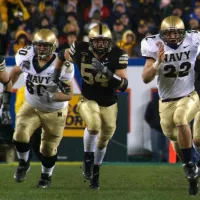
College football is a popular amateur sport in the United...

Washington D C is the capital city and federal district...
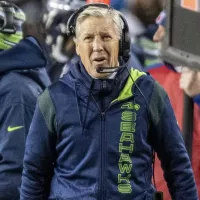
Peter Clay Carroll is an American football coach He is...
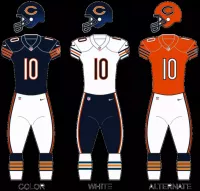
The Chicago Bears are a professional American football team based...
Trending

2 months ago Alina Habba Disqualified: Court Rules Against Former Trump Lawyer in New Jersey Role

3 months ago Alcaraz vs Fritz Clash at ATP Finals 2025: A Minute-by-Minute Look

2 months ago Japan-China tensions rise: Japan warns citizens, Chinese travelers cancel flights. Crisis deepens.

2 months ago Carlos Alcaraz Honored as ATP Year-End No. 1 After Finals Win
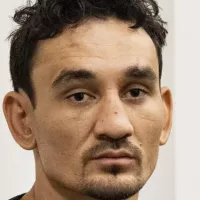
Jerome Max Keli'i Holloway is an American professional mixed martial artist competing in the UFC's Featherweight and Lightweight divisions A...

4 months ago Muratori wins ITA Regional Singles Championship, Gonzalez runner-up in Doubles, Women's Tennis wraps up
Popular

Thomas Douglas Homan is an American law enforcement officer who...

XXXTentacion born Jahseh Dwayne Ricardo Onfroy was a controversial yet...

William Franklin Graham III commonly known as Franklin Graham is...

Jupiter is the fifth and largest planet from the Sun...

Instagram is a photo and video-sharing social networking service owned...

Martin Luther King Jr was a pivotal leader in the...
